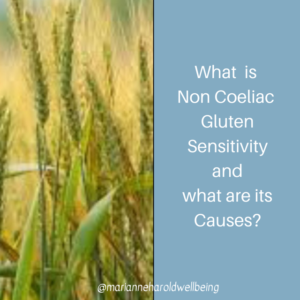Causes of Non Coeliac Gluten Sensitivity can be contributed in particular to two main factors. Gluten consumption in non-coeliacs (in particular wheat) can lead to Inflammatory Bowel Syndrome (IBS) type symptoms as well as creating intestinal dysbiosis (commonly known as leaky gut) and worsening of existing chronic health conditions. These conditions are growing worldwide.
In clinic I often recommend clients remove certain grains, in particularly wheat, from their diet. This is often met with scepticism because they have not been diagnosed with Coeliac Disease. I explain to them that they may have ‘gluten sensitivity’. This condition is not only due to gluten (or gliadin) in found in certain grains.
Non Coeliac Gluten Sensitivity
The development of ‘non coeliac gluten sensitivity’ & inflammatory symptoms can be triggered by another family of proteins found in wheat (as well as rye, barley, oats & millet) called amylase-trypsin inhibitors (ATIs). ATIs can trigger immune reactions in the gut that can manifest in other tissues and worsen symptoms of:
- asthma,
- rheumatoid arthritis,
- multiple sclerosis,
- lupus,
- non-alcoholic fatty liver disease, and
- inflammatory bowel disease.
The rise in numbers of people experiencing ‘gluten sensitivity’ (and coeliac disease) is also believed to be related to the use of glyphosate, the active ingredient found in the herbicide, Roundup (produced by Monsanto). *Australia & the USA spray wheat, corn and soy crops heavily with glyphosate and it needs to be noted that Monsanto is not required to list all ingredients on Roundup.
Glyphosate Exposure
Glyphosate has been used increasingly since the 1980s since when gluten sensitivity and coeliac disease has increased. Prior to then very few people had heard of gluten sensitivity. It has been labelled a carcinogen by WHO.
Published in the journal Interdisciplinary Toxicology in 2013, a study begins by proposing that “glyphosate, the active ingredient in the herbicide, Roundup, is the most important causal factor” in an increase in celiac disease and gluten intolerance worldwide. It concludes that characteristics of coeliac disease can be explained by glyphosate properties. The characteristics include:
- deficiencies in minerals – glyphosate chelates minerals and carries them out of the body,
- an overgrowth of pathogens in the intestine coupled with a decrease in beneficial gut bacteria – leads to gut function disruption,
- impaired serotonin & endocrine signalling – leading to mood & hormonal disorders,
- increased oxidative stress to the body – contributing to cardiovascular & auto-immune disease.
In a 2013 swine study on this topic, the authors argued that “The symptoms of so-called ‘gluten intolerance’ and coeliac disease in are shockingly similar to the symptoms in lab animals exposed to glyphosate.” Other studies including ones done on poultry (Shehata et al., 2013) and cattle (Kruger et al., 2013) it was seen that glyphosate disrupts the balance of gut bacteria.
This is concerning because we find wheat, (as well as corn and non-GMO soy) are the basis of many foods in a standard western diet – also known as SAD.
If you think you may be experiencing a gluten or non coeliac gluten sensitivity, or you feel your mood is affected by your diet, and want support with these issues, why not book a 15 minute complementary call or make an appointment with me? Mobile 0417875718.

